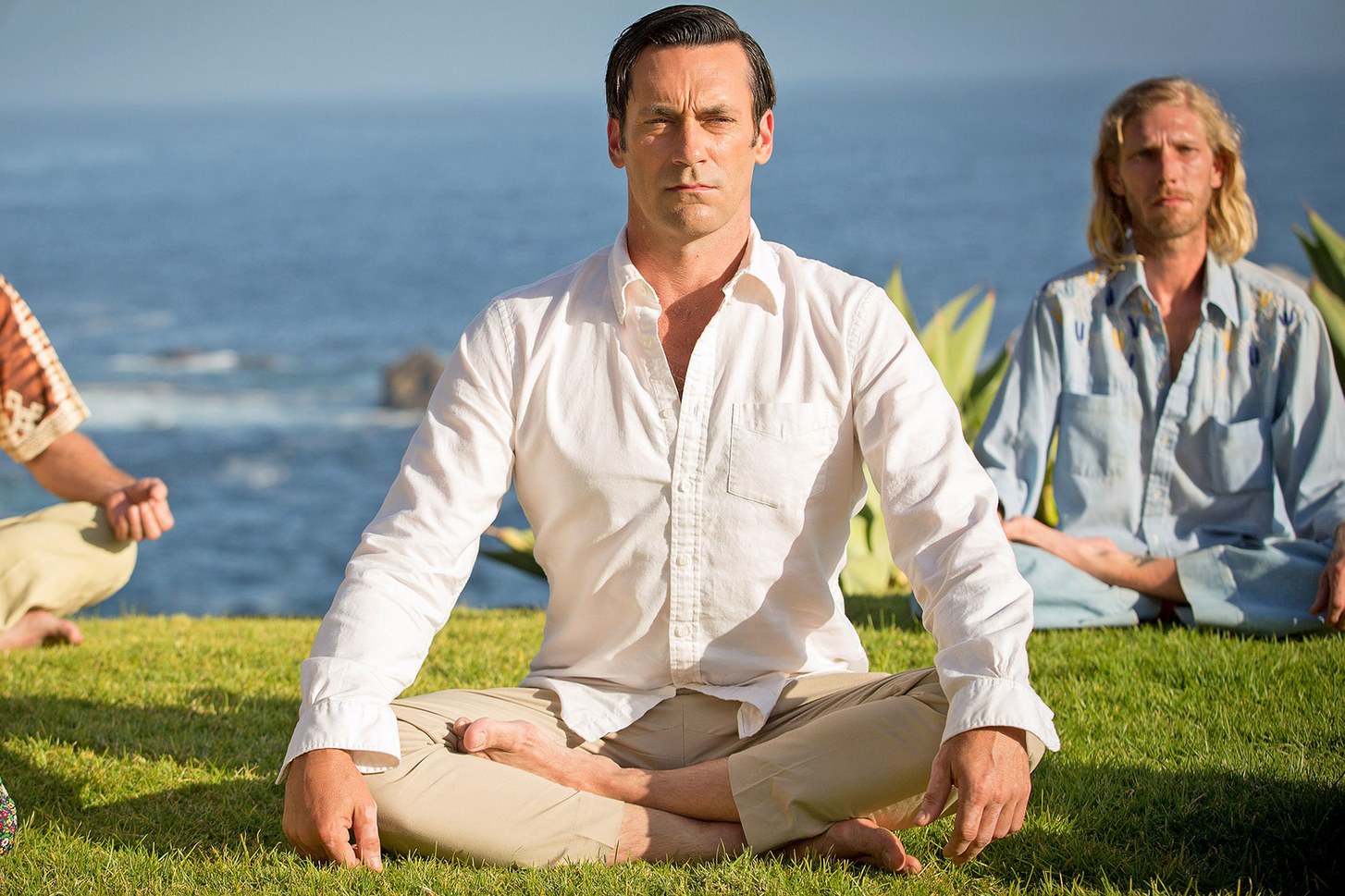[Published: Radio Times]
“There is no ‘system’. The universe is indifferent.”
Don Draper, 1960
…
“Om.”
Don Draper, 1970
As Don says, ‘a lot has happened’ in between.
The internet’s approach to Mad Men made you wonder whether you were watching a completely different show. The idea that Don/Dick would turn out to be real life plane hijacker D.B. Cooper joins a long line of crackpot theories, including Megan getting murdered by the Manson Family and ‘Strangler Bob’. These wiki-lit-crit essays fundamentally missed the point. For one thing, Mad Men tried to play its historical events lightly – it wasn’t Forest Gump with cleavage. Then there were the fans convinced it would end with a remake of the opening: Don hurling himself from the roof of Sterling-Cooper-Draper-Pryce-Holloway-Harris-McCann-Erickson-Waterhouse-Cooper West.
Remember the cat from the Flintstones? The one that locks Fred out of the house during the theme song? How often did you actually see it in an episode? What dunderheaded, tone-deaf show were these people watching?
Nevertheless, the back half of series seven did borrow one idea from the title sequence, that of everything and everyone falling away until Don is left alone. The last few episodes have seen Don cycling through his previous identities (veteran, hobo, Californian Dick, dickhead) but the first image of the finale is truly baffling. Open on: Don tearing it across the salt flats in a hot rod. You expect it to be a dream, but no, Don is really living some sub-Kerouac fantasy.
Is Don nostalgic, or is he just aching from old, old wounds? Mad Men’s grown ups have never been particularly grown up, but as a new decade dawns, they are positively infantile. (See also: Joan’s tanned, feckless, two episode boyfriend.) It’s up to the next generation to take charge. The petrolheads help Don in his stupor, Sally becomes woman of the house and cuts her father out (“adults make these decisions,” Don says, correctly, pathetically) and Stephanie packs him off to a commune – a shift from On the Road to Big Sur/The Dharma Bums.
And there, against every expectation, Don finds peace.
A happy ending! How truly, utterly unexpected. Don strapping on a parachute would have been less jarring.
Let’s be frank. If Mad Men had ended after its magnificent first series, it would still have gone down as the Greatest Programme Ever Made. From that point on, it has dedicated itself to confounding expecations. The finale shocked in how willing it was to dole out happily ever afters. Roger has an age appropriate Frencher-than-French fiancé, and he can crack wise in a whole new language. The Campbells, reunited, board a private jet, dressed up like the Kennedys in a TV movie. The Draper-Francis household is more functional than it has ever been, even with the spectre of cancer hanging over it. Joan – the woman everyone wants– at last realises she doesn’t need anyone, not even Peggy. (‘Two names in the title’ was the gag of the episode.) Meanwhile Ms Olson stops talking like an Apprentice candidate (“spoken like a failure”) for long enough to find love. Soppy, overflowing, ‘I love you’ Love. The kind they use to sell nylons.
And it’s that chink, that slight hollow ring, that makes the finale so strange, so brilliant, and so unlike the predictions of internet commenters. Whatever you thought of the hour that preceded it, ending with the Coca-Cola Hilltop advert – possibly the most famous in the history of the medium – was completely, utterly perfect.
Of course, it’s a tart joke on the counter-culture lifestyle, a reminder that Don’s new peace, love and yoga outlook was almost immediately co-opted. As the man says, ‘They still take money. That’s a good sign.’
Those literal-minded interneters say that Don left the camp, returned to McCann and pitched to Coke. They could be right. After all, happiness is the moment before you need more happiness. But it’s more than that.
Previously when he was pitching a campaign, this handsome son of a whorehouse always sold himself as an aspirational dream, a certainty of self built on deception and fraud. Now he realises the new dream, the dream of the 1970s, is reinvention rather than reassurance. Poor Henry Francis was rarely given much to do, but he did get to state one of the show’s main themes outright. “There is no fresh start,” he once chided Betty, “life carries on.”
Compare and contrast to the ‘New Dawn, New You’ of the commune.
Old Don believed that happiness was a billboard telling you that ‘whatever you are doing, you are OK.’ The New Dawn’s new Don recognises himself in a stranger’s suffering, and finds release. You are not OK, and that’s OK. We are all broken.
I can sell that.
Mad Men has always fixated on the gap between appearance and reality, the essential falsehood and psychological terrorism of advertising, but the really subversive thing about the finale was it suggested that an essentially false happiness could have its own value. Don finally bought what he had been selling all along and, if only for a moment, he found peace.
Maybe it’s not quite the Real Thing. But maybe’s that’s enough.
